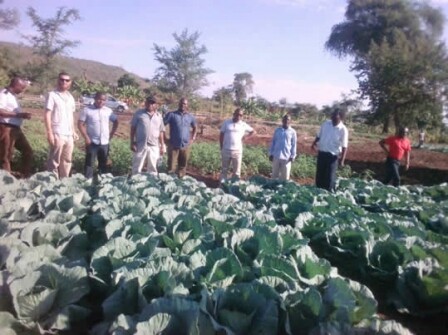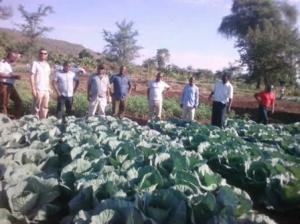
Project Concern International (PCI) Malawi through its Njira Project has constructed 54 small irrigation schemes in Balaka and Machinga, enabling farmers in the districts to cultivate various crops thrice per year.
The organisation has since expressed satisfaction on how the project has helped farmers especially in capacity building and building resilience.

Recently, the NGO organized a media tour in Balaka and Machinga district to enable the scribes appreciate what the project has achieved in the past five years.
According to Michael T. Ghebrab, chief of party for Njira project at PCI, the project has addressed various challenges in thematic areas of nutrition, reproductive health, disaster risk management (DRM) as well as irrigation.
On irrigation, Ghebrab said the construction of 54 small irrigation schemes in Balaka and Machinga districts thereby enabling farmers to cultivate various crops thrice per year, hence boosting yields and income generation.
”As you can recall that Balaka and Machinga districts are mostly hit hard by drought almost each and growing season, these irrigation schemes have been instrumental to farmers as they are now able to realise more yields despite of any threats of drought,” said Gehbrab.
The chief of party also divulged that the project has seen over 30,000 farmers benefiting in various areas while 17,000 farmers have access to livestock through a pass on program a development which has boosted meat production at district level apart from helping individual farmers uplift their socio-economic status.
In a drive to ensure the sustainability of the livestock pass on program, PCI has managed to train community animal health workers (CAHW) at Mikolongwe School of veterinary and they closely work with the district veterinary office to provide capacity in livestock management at community level.
Another remarkable development that the project has achieved can be clearly witnessed in Chatama village, traditional authority Amidu in Balaka district.
For nearly 15 years, the area has experienced serious problems arising from floods which have most of the times rendered the villagers helpless and hopeless after losing their valuable assets.
But it was in the year 2015 that villagers embarked on Chilanga river drenching project which saw PCI partnering with them in training the villagers in river drenching techniques.
In the end, the villagers managed to construct a 1.1kilometres river and reclaimed 52.5 land which was previously lying idle but now it is being used for cultivation.
Njira project has indeed lived to its dream of creating pathways to sustainable development as Wasili Mtwana, chairman of the Chatama village development commit (VDC) narrates.
”Our livelihood have tremendously changed for the better. We no longer experience floods and this has enhanced issues of sanitation and health standards in among the villagers.
“We are also excited because through irrigation interventions, we are now able to empower ourselves socio-economically. For instance, in my case, I managed to construct a standard iron sheets roofed house. I am also able to pay school fees for my three children who are at secondary school level.”
Ghebrab has thanked the ministry of agriculture and the communities for their good working relationship which has made the project successful.
He believes that the project has planted seeds that will continue to bear good fruits even in the future.
However, he bemoaned the culture of some Malawians on dependence instead of working hard on their own to be self-reliant.
Meanwhile, he has asked the beneficiaries to collectively work together to realize sustainable development in their endeavours.
PCI-Malawi was implementing the five year USAID funded project in Balaka and some parts of Machinga with funding of 25 million United States dollars.














